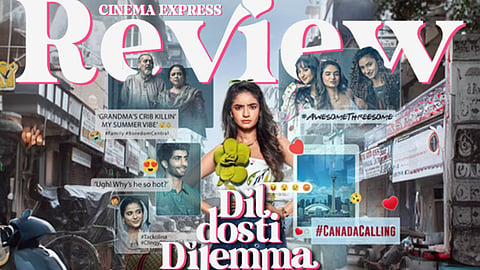Dil Dosti Dilemma Series Review: A dated TV soap in the guise of a young-adult drama
Dil Dosti Dilemma(1.5 / 5)
With Dil Dosti Dilemma, there are some uneven similarities between Prime Video’s other recent shows exploring female friendships through a coming-of-age narrative. Released last month, Nitya Mehra’s Big Girls Don’t Cry revolves around a world of boarding schools, featuring fresh faces as they sail through a young adult adventure which slowly crumbles under the weight of its own narrative. It succumbed to the desperate need to create political statements when it could have just been a tale of sisterhood, love, and all the complexities that come along. However, it was still a competent show whose ambitious flight had a turbulent landing. On the other hand, Dil Dosti Dilemma is loose in its making, with a narrative that is largely predictable, playing out more like a dated television soap than a new-age exploration of its themes.
Director: Debbie Rao
Cast: Anushka Sen, Revathi Pillai, Kush Jotwani, Vishakha Pandey, Elisha Mayor, Tanvi Azmi, Shishir Sharma
Its connection with TV serials is not just through the lousy storytelling. The lead actor, Anushka Sen, has appeared in some television shows over the years and is popularly known for playing the role of Meher in the children’s fantasy show Baal-Veer. She is a familiar face and it takes a long time to get used to seeing her in the role of Asmara, an entitled teenager whose plans of going to Canada over the summer vacations are cut short when she misbehaves with her grandmother. Instead of taking a trip abroad, she is sent to Tibbri Road, to her grandparent's house. Tibbri Road is essentially an impoverished Muslim neighbourhood. In order to maintain her image, Asmara lies to her best friends, Tania (Elisha Mayor) and Naina (Revathy Pillai) and tells them that she has in fact made it to Canada. The three get on a video call every day and Asmara puts up a sheet with skyscrapers printed on it in the background to hide the dullness of her room. The fact that she calls from the same Indian number doesn't seem to raise any questions.
This logical fallacy wouldn’t have mattered as much if there was any heartfelt resolution instead of gimmicks and superficiality. Asmara’s quest to understand a world devoid of her privileges is filled with some simplistic choices. Her opposite is found in the character of Rukhsana (Vishakha Pandey). She is of Asmara’s age and lives in the neighbourhood, but the environment has shaped her differently. On paper, it feels like an elaborate and thought-provoking dichotomy is established through the two. However, it never goes beyond the repetitive snubs by Asmara to correct Rukhsana’s broken English. Rukhsana is excessively naive and full of life, with little agency of her own. The writers’ understanding of class differences doesn’t go beyond the constant wordplay between Hindi and English. All of it operates largely over the surface without scratching the complexities of living in an underprivileged environment. Because of this unfocused approach, the show ends up dehumanizing the people in the neighbourhood, reducing them to their ‘backward’ thinking and menial ways. Finally, it takes an entitled and privileged teenager to make them see life in new ways as she stops fights between families, brings a new perspective to their protests against crony builders and saves them from all troubles, leading to a celebratory climax.
The show ends in the same way it begins: by not making you feel enough for its characters. As the show struggles to keep itself afloat, it seems that the makers have mistaken old-school for ancient. It shows an overbearing focus on a budding romance in the lanes of a shabby locality leading to mushy interactions on terraces of decaying houses. In the middle of all this, there are some genuine moments featuring Tanvi Azmi and Shishir Sharma that make you root for them, however these are too scarcely placed. In its current state, the show puts on the burden of being socially relevant by crafting ineffective scenes filled with tiring discussions on jeans over salwar kameez. By doing so, its Dil is left meandering through the narrative, the Dosti is riddled with cliches and Dilemma? Well, that’s all we are left with.


